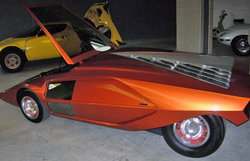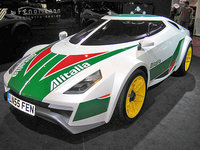Lancia Stratos
| 250px | |
| Lancia Stratos HF | |
|---|---|
| Aka | Lancia Stratos |
| Production | 1972–1973 492 produced |
| Class | Sports/Rally car |
| Manufacturer | Lancia |
| Layout | MR layout |
| Parent company | Fiat Group |
| Engine | 2418 cc 65° V6 |

The Lancia Stratos HF, widely known as Lancia Stratos was an automobile made by Italian car manufacturer Lancia. The HF stands for High Fidelity.
The Stratos was a very successful rallying car during the 1970s and early 1980s. It started a new era in rallying as it was the first car designed from scratch for this kind of competition. The three leading men behind the entire rallying project were Lancia team manager Cesare Fiorio, British racer/engineer Mike Parkes and factory rally driver Sandro Munari.
The bodywork was designed by Marcello Gandini, head designer at Bertone, and the technical layout was loosely based on a (Lancia Fulvia V4 powered) concept car called Stratos Zero first shown at the Turin Motor Show in 1970. The body was wedge-shaped, and unusually short and wide, providing maximum traction.
In 1971 Lancia presented the Lancia Stratos HF prototype. The Stratos prototype (Chassis 1240) was fluorescent red in colour and featured a distinctive crescent-shaped-wrap-around windshield providing maximum forward visibility with almost no rear visibility (which was unnecessary for rallying anyway). The prototype had three different engines in its early development life: the Lancia Fulvia engine, the Lancia Beta engine and finally the mid-mounted 190 bhp (140 kW) 2418 cc Dino Ferrari V6.
Lancia did extensive testing with the Stratos and raced the car in several racing events where Group 5 prototypes were allowed during the 1972 and 1973 seasons. Production of the 400 cars required for homologation in Group 4 were launched in 1973 and the car was homologated for the 1974 World Championship. The Dino V6 was phased out in 1974, but 500 engines among the last built were delivered to Lancia.
For racing, the engine was tuned up to 280hp and even to 560hp with a single KKK turbocharger. However, turbocharged versions were only allowed to compete in Group 5 and were never as reliable as their naturally aspirated counterparts.
The car won the 1974, 1975 and 1976 championships in the hands of Sandro Munari, and might have gone on to win more had not internal politics within the Fiat group placed rallying responsibility on the Fiat 131 Abarths. The Stratos won the Monte Carlo Rally with the private Chardonnet Team as late as 1979.
Without support from Fiat, and despite new regulations that restricted engine power, the car would remain a serious competitor and proved able to beat works cars in several occasions when entered by an experienced private team with a talented driver. The final point to the Stratos's racing career at international level took place as late as 1981, at the Tour de Corse Automobile, a World championship event, with a victory of Bernard Darniche.
When the Fiat group favored the Fiat 131 for rallying Lancia also built two Group 5 turbocharged 'silhouette' Stratos for closed-track endurance racing. Theses cars failed against the Porsche 935s on closed tracks but proved successful in hybrid events. While they failed in the Tour de France Automobile, one of these cars won the 1976 Giro d'Italia Automobilistica, an Italian counterpart of the Tour de France Automobile. Unfortunately one of the cars was destroyed in Zeltweg, when it caught fire due to overheating problems. The last surviving car would win the Giro d'Italia event again before it was shipped to Japan to compete in the Fuji Speedway based Formula Silhouette series, which was never raced. The car would then be sold and reside in the Matsuda Collection before then being sold to the renowned collector of Stratos', Christian Hrabalek, a car designer and the founder of Fenomenon Ltd.
Hrabalek has the largest Lancia Stratos Collection in the world- he owns 11 unique Lancia Stratos cars, including the fluorescent red 1971 factory prototype and the 1977 Safari Rally car.
Production
With only 492 ever made, the Stratos is very rare to this day.
In 1978, Bertone created and designed a concept car based on the Stratos called the Sibilo.
In popular culture
- The Stratos was featured in the cartoons The Transformers as the Autobot Wheeljack (Lancia Stratos Turbo)
- It appeared in Ghost in the Shell: Stand Alone Complex as the vehicle of Batou.
- It was in the video games Muv-Luv and Muv-Luv Alternative in which the character Kouduki Yuuko drives one.
- The Stratos was massively introduced to younger audience with its appearance in the 90's world classic racing game Sega Rally Championship and has since popped up in various videogames including Top Gear Rally 2, Project Gotham Racing 2, Forza Motorsport, Colin McRae Rally, Gran Turismo 4, Rally Trophy and Colin McRae: DiRT.
- In the Anime éX-Driver, one of the three lead characters, Lisa Sakakino, drives a blue Group 4 specification Stratos with an attached lamp pod onward from episode 2 after wrecking her WRC Subaru Impreza on the previous episode.
- In the Choose your own adventure book The race forever, one of the cars available was a Lancia Stratos.
- The prototype Lancia Stratos 0 was featured in the 1988 film Moonwalker (as a shape-shift Michael Jackson). The automobile now resides in the private show room of the Bertone stile center at Caprie (in Susa Valley). Three reproductions were made for the filming of Moonwalker- the last remaining is owned by car designer Andy Saunders. See appearance at 4:00 minutes [2]
- It was also featured in Herbie Goes to Monte Carlo (1977), as one of the cars in the Trans-France Race. Being one of three known Lancia cars in the race, this car was red with white stripes and gold wheels, as well as a number 4 on the sides. The other two were Lancia Fulvia Sport Zagato and a Lancia Scorpion, the latter playing a leading role. The Zagato was red with a number 16 on the sides.
- A Gr.5 silhouette version can be seen in the 1970s manga, Circuit Wolf (Circuit no Ookami).
Fenomenon Stratos
At the Geneva Auto Show of 2005, a British design firm known as Fenomenon debuted a retromodern concept version of the Stratos.
External links
- Lancia Stratos chassis numbers
- Stratos fan site
- Lancia Motor Club (UK)
- Article about the Lancia Stratos Group 5 silhouette car
- Extensive image gallery of the Lancia Stratos Group 5 silhouette car
| LANCIA | ||||||||||||||||||||||
|---|---|---|---|---|---|---|---|---|---|---|---|---|---|---|---|---|---|---|---|---|---|---|
|
1907-1918: Alfa-12HP · Alfa-24HP · Dialfa-18HP · Beta-15/20HP · Delta-20/30HP · Epsilon · Eta-30/50HP · Gamma-20HP · Theta-35HP · Zeta-12/15HP
| ||||||||||||||||||||||
| Vincenzo Lancia · Corporate website · A brand of the Fiat group | ||||||||||||||||||||||


